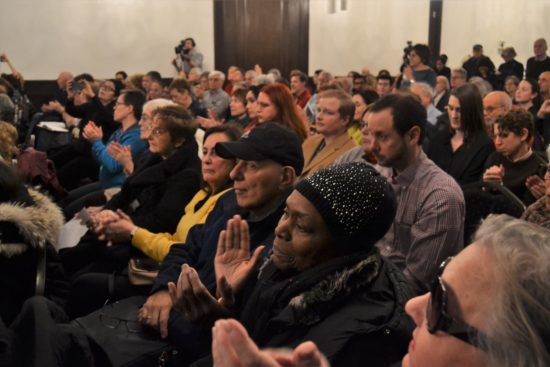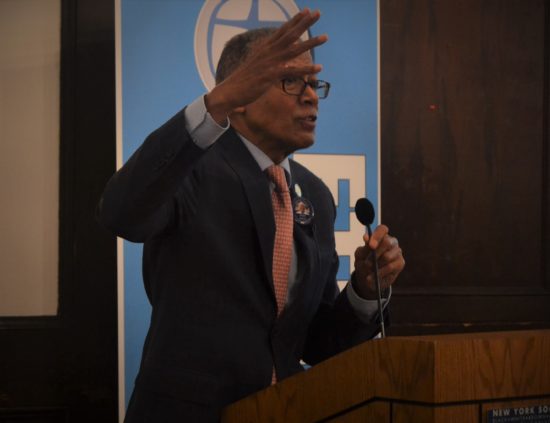
A large crowd showed up to discuss retail vacancies.
By Megan Zerez
UWS Save Our Stores, a grassroots organization aimed at reducing the number of long-term vacant storefronts on the Upper West Side, held its first town hall meeting last Thursday night at the New York Society for Ethical Culture. More than 150 people came to hear elected officials present plans to address retail vacancy rates.
Officials in attendance included City Comptroller Scott Stringer, Manhattan Borough President Gale Brewer, State Senator Robert Jackson, City Council Member Helen Rosenthal, and State Assembly Member Linda Rosenthal.
Just over 10% of retail space on the Upper West Side is vacant, according to a report from the comptroller’s office, presented at the meeting. But UWS Save Our Stores President Beth Krieger said the organization’s own survey of storefronts on Broadway between 67th and 104th Streets indicated a 20% retail vacancy rate. Krieger also said that the closure of grocery stores is a major concern on the Upper West Side. “We’ve lost three supermarkets: Gristedes, West Side Market and Food Emporium.”

To help supermarkets retain their leases, Borough President Gale Brewer said she has proposed a bill that would eliminate the commercial rent tax for some grocery stores. The exemption would only apply to “affordable” grocers. Chains like Whole Foods and Trader Joe’s would not be exempt.
Currently, the effective commercial rent tax is 3.9% and applies to all businesses in Manhattan south of 96th Street with annual rents above $250,000.
Council member Helen Rosenthal said the city relies on this tax to fund essential services, but she has proposed modifications to it so as not to overburden small business owners. She called for raising the rent exemption cap from $250,000 to $1 million. To remain revenue neutral, she has also proposed an increased tax rate for larger retailers.
Stringer said that another solution to help small businesses stay in place would be to relax certain city sanitation and safety regulations in order to relieve the pressure of “red tape.”

Jackson urged attendees to support the recently resurrected Small Business Job Survival Act. Brewer, who backed the bill, said that it would give small businesses a conduit to better negotiate lease renewals. The bill has failed to pass several times. In January, the New York Law Review criticized it for effectively aiding corporate businesses, as none of the protections in the bill are specific to smaller retailers.
While residential rents continue to climb, a Real Estate Board of New York report, cited at the meeting, stated that retail rents are decreasing. Brewer criticized the report, saying any decrease is nominal. The electeds also voiced support for a vacancy tax for commercial landlords, but later clashed over how strict regulations ought to be.
Time constraints limited the number of audience questions, but attendees said the event was still worthwhile.
“This was a well-publicized meeting,” said Karen Goodheart, a retiree and Upper West Side resident. “I’m glad I attended.”
Goodheart said that before the meeting, she hadn’t heard about UWS Save Our Stores, which was founded last January, but the star-studded guest list caught her attention. She said she plans to attend future meetings.
“This was all new to me,” Goodheart said. “So it was very informative. And it’s very overwhelming.”
Still, it could be worse. According to the data, while the Upper West Side does have higher retail vacancy rates when compared to the rest of the city, it’s not the hardest hit area. Of the neighborhoods covered in the comptroller’s report, Crown Heights and Ocean Hill in Brooklyn are near-tied for the highest share of vacant storefronts, each at almost 19%.









Gale Brewer wants to exempt only “affordable grocers” from the commercial rent tax? I’m curious what she considers to be “affordable grocers”?
How is Trader Joe’s not “affordable”? Just about everything in TJ’s is light years cheaper than any other supermarket or small bodega.
There’s a reason Gristedes, West Side Market and Food Emporium went out of business – they couldn’t compete in terms of price, quality and selection with supermarkets that are thriving like Whole Foods and TJ’s.
Then there’s Robert Jackson calling for the Small Business Survival Act. This is little more than commercial rent control. Residential rent control has been a disaster for the city. Imposing this nonsense on commercial property will be a bigger disaster.
Helen Rosenthal wants to eliminate the Commercial Rent Tax on small business – actually a good idea – but she wants to increase it on large retailers – a terrible idea.
Many large retailers are barely keeping their heads above water due to online competition. Why should they have an undue tax burden in order to “fund essential services”?
We don’t need a bunch of politicians pandering to ignorant constituents by imposing bureaucratic regulations that prop up weak businesses and punish successful ones.
The reasons for the demise of retailers in the city is complex and largely the result of changing times and technologies. The “solutions” recommended by these politicians will only make a bad situation far worse.
Other than Key Foods and Westside Market, I’m having a hard time coming up with “affordable” grocers in the neighborhood that aren’t Trader Joe’s and Whole Foods.
I find that people who aren’t familiar with the Trader Joe’s brand often assume that it’s a more expensive, boutique option. When in reality, it’s one of the best value options in the city, and *far better* than the wildly overpriced grocery chains like Gristedes and D’Agostino. But I also don’t think TJ’s would need the exemption anyway — their 93rd Street and 72nd Street stores are doing incredible business and are always busy. If the right retail space opened up in the 80s on Broadway they would probably consider it even without a tax exemption.
There is a massive space on 86th and Broadway: the former Gristedes on basement level + former Banana Republic on street level.
That was the Gap. When the Gap closed, the Banana Republic across the street closed and moved into the old Gap space, which I really miss.
Trader Joe’s is affordable, yes – and I love it. It’s also a national chain. Gristedes, Food Emporium aren’t.
I doubt TJ would open there, as I am not sure it is big enough. Though the location for me is smazing
Are the old Gristedes and BR spaces contiguous or easily combined? They would need to fumigate the stale Gristedes stink out of that space before turning it into another supermarket.
I’ve been crossing my fingers that Trader Joe’s or Whole Foods will bite at that location. Particularly Whole Foods, since they only have options at 98 & Columbus and Columbus Circle right now — both of which are a hike for anyone living in the 70s and 80s. Now that Trader Joe’s will have two locations on 14th Street just a few avenues apart, then opening at 86th & Broadway feels totally reasonable considering the lack of options in the area and how packed their other locations in the neighborhood are.
Agree 100%. I can get enough groceries for 2 weeks at Trader joes for about $50. If I were to shop at D’Agostinos that $50 would get me about 4 days worth of groceries.
Agreed. The “affordable grocer” idea is asinine. There’s a Gristedes around the corner from me, but I shop at a Whole Foods 8 blocks away in order to save money. Gristedes is far more expensive than Whole Foods, particularly across organic products.
With approximately 90% of the storefronts occupied across the UWS, I am not sure the outcry regarding commercial rents reflects the “facts”.
Why would it be a concern to loose those three or four supermarkets if there are still plenty of of places where you can buy food: Key Food, CVS, Trader Joe’s, Citarella, Fairway, Westside Market, Jubilee, Pioneer, Zabar’s, Zingone, Morton Williamsn, Whole Foods,…and that is not counting delis or Fresh Direct. For the love of God, how many supermarkets does one need ?!
What is an “affordable grocer”? Affordable to whom? Affordable based on what? How about affordable clothing stores? Would affordable pharmacies qualify? People need clothes and medicine.
Why is it always the answer to tax the wealthy – never to cut costs.
Would lowering sanitation standards mean dog poop in the stores – not just all over the sidewalks?
Zoning endorsed by Gale Brewer has limited landlord options to rent to larger tenants. Large properties on the avenues have to subdivide retail space. Supermarkets are the only businesses that can have large storefronts. Banks are favored to have small storefronts. Competition is stifled by the rules. The new supermarkets are only showing up in the non enhanced districts with new buildings. The new buildings also have rental space that is larger and more attractive to renters.
“Affordable” supermarkets, grocery stores or whatever for some fall into same demographic as housing; they want/need something dirt cheap because that is all they can or are willing to pay.
It has been proven time and time again by various sources Trader Joe’s, Whole Foods, and even Fairway (among others) are actually quite reasonable in terms of prices. You just have to do what budget concious shoppers have for ages; know prices and perhaps look around for good deals.
Red Apple, Gristedes, Sloane’s, and now DAG are now all owned by same company (Red Apple), and quite honestly all survived long as they did because in many areas they were only game in town supermarket wise.
Gristedes and DAG charge far more than WF or TJ’s for merchandise often same items. The former stores are also often dirty, poorly staffed, and quite honestly unappealing. Persons getting best deals from either Gristedes or DAG are those who rummage through their garbage bags at night.
DAG was a great store back in day, but family ran it into the ground, and now they’ve been pushed out.
Simple truth is people have many more options than back in the day, and they are using those choices. Fresh Direct, PeaPod, and don’t forget Rite Aid, DR, CVS, Target and Walgreen’s have expanded to become mini one stop shopping places as well. You can get fruit/veggies on any corner from those carts.
I miss the old DAG commercials – “Please Mr. D’agostino, come closer to me!”
They don’t do advertising jingles like they used to. Dick Lewis is watching!
I am skeptical that policy moves can rejuvenate retail. The rents are too high. Unless and until landlords reprice retain inline with the ability of tenants to pay the space will remain vacant.
I do wish that landlords would be forced to maintain their premises though. Vacant stores become a blight which drags down whole blocks and neighborhoods.
Starting a new business is very expensive. In addition to high rents landlords make new businesses pay for the improvements to their old buildings. High overhead and long construction times are a problem. New buildings are needed that have the modern amenities businesses need.
Could not agree more.
Landlords have a right to set their rents as high or as low as they want. The same way that those who own the properties before them had a right to sell them the land/property at whatever price they could agree on.
Having said that, rents are too high, but not just across retail space. Residential rents are too high as well. Parking garage prices are through the roof. Commercial rents are by no means that only thing that keeps going up.
I also wish landlords kept their stores a bit cleaner/tidier.
Not sure raising threshold to $1M will help because many small renters get tax “passed through” from large over landlords.
I wondered the same thing about Trader Joe’s. Anyone who doesn’t consider it affordable hasn’t shopped there. What exactly IS their definition of an affordable groder??
Key Food – afforable
Key Food is no more affordable than Whole Foods or Trader Joes.
Taxes are high across the board, both for rental and commercial spaces. Landlords have no choice but to pass on this burden to the renter. Drop taxes for a period of a few years and observe rent prices decrease, as landlords compete with each other.
Another burden affecting the retailer is the cost of delivering goods to the UWS. With all these bike lanes in place, delivery trucks are racking up tickets for illegal ‘double’ parking along Columbus and Amsterdam Avenues. These extra costs are also being passed along to the commercial renter via higher cost of goods.
Don’t know if our UWS leaders are talking to our commercial renters, but its not becoming viable to do or conduct business in UWS or Manhattan altogether. Just too expensive. 🙁
Access-a-Ride vehicles for the elderly or disabled also get tickets for double parking which, with the bike lanes, is really triple parking.
Delivery charges are now part of the cost of doing business. The tolls into Manhattan don’t help either.
Not clear to me how Columbus or Amsterdam bike lanes increase double parking. There are still plenty of parking spaces on these avenues. The main thing the bike lanes took away was a lane of through traffic.
TD Bank on 109 and Broadway has just moved into a smaller space next door. Are they downsizing?
Many banks are either closing branches and or going for smaller spaces.
Same reasons as retail, push to move banking online has lessened need for large or numerous branches.
Even where you find good sized or even small bank branches they are often very light on staffing.
Capital One and many other banks have closed many locations in NYC and elsewhere.
The sidewalks are crowded but there is a lack of foot traffic needed for smaller businesses. Online deliveries keep people at home and are also a big part of the food vendor business further reducing people on the street. Empty storefronts give consumers even less reason to leave their homes to visit those areas.
What the elected officials are not addressing is the lack of business oriented foot traffic that would make the empty storefronts more attractive to rent. Getting more magnet stores that will bring customers should be a priority for Broadway and Amsterdam Avenue.
For all the hand wringing, moaning and wailing people on UWS ought to take a trip over to UES. Madison Avenue might be having problems, but Lexington, Third, and Second seem to be doing rather well.
There is less vacancy and when places do become empty many are rented in less than a few months.
Thus proving point found in numerous studies including most recent by city comptroller; it all comes down to local spending habits.
Just as with everything else, if someone thought a large new supermarket or whatever would work on UWS, they’d open one.
For now UWS seems to be mostly getting an endless litany of food/drink places of dubious quality, and many don’t last very long it seems. Throw in fitness, nail salons, pet grooming/sitting and that pretty much sums things up.
The UES has been struggling with vacancies. I lived on Third Avenue and between 59th and 86th it was a wasteland of empty storefronts, large and small, for a number of years. And then it got worse with the 2nd Ave subway — fewer people were shopping or eating on Third. The current turnaround they’re experiencing is the result of rents dropping significantly. Then came a domino effect of big tentpole brands coming to Third Ave like IKEA at 60th, Target at 70th, Morton Williams at 72nd, Joe & the Juice at 75th, Levain Bakery at 83rd, Rumble at 84th, Ulta at 86th, and Chick-fil-A at 86th. And now that customers have a reason to go there again, new smaller businesses are also taking a shot on Third and filling in the gaps.
For Broadway in the 79th Street to 96th Street range, I think its success comes when it shifts from a bank and big-box retail corridor to one with a similar balance as Third: one that’s about recurring foot traffic. Broadway’s competitive advantage is space but it’s clogged with big retailers that you can find online and banks that have branches everywhere. It needs businessss that you’ll make part of your weekly routine and are unique. Think fitness brands that can’t fit into the small spaces on Amsterdam and Columbus and that has members coming multiple times a week, value-driven goods retailers like Target and Trader Joe’s that are relatively immune to online trends, restaurants that offer good food at reasonable prices and could use the bigger spaces to do higher volume (Broadway in the 100s does this well), and cafes and fast-casual restaurants where the community can come during the day to study and eat and socialize.
City of New York, who has been spending like a drunk sailor on leave under current administration receives majority funding from property taxes. Of those sums commercial properties pay the highest share (co-ops and condos next, 1-3 family homes least).
Thus unless city cuts spending (good luck with that), any reduction to one person’s or whatever tax means others will have to pick up difference.
In case Brewer, Rosenthal et al haven’t noticed large retailers are closing stores. Banks are shrinking their presence, so are convenience stores, Starbucks, etc…. So just who are these “large retailers” Mrs. Brewer seeks to soak with higher taxes that won’t simply pack up and move?
A huge portion of the city’s spending is for pensions and benefits for union employees. It is absolutely ridiculous what they receive – completely out of line with anywhere else in the country.
Perhaps the union employees with these Cadillac benefits could reinvest some of their bounties in the city?
For last time, Food Emporium stores closed because parent company A&P went bankrupt.
Key Food (IIRC) or maybe Morton Williams bought licensing rights to FE, which is why the one at Trump building on Third and 68th is still open.
Why would anyone want to rent a space when there will be no parking for customers, just bike lanes (that bikers hardly use)?
Free parking for transients driving on Amsterdam and Columbus Avenues allowing stops at local businesses would make renting a storefront more attractive. Off street parking is in short supply and too expensive for short term stays. A municipal lot that allows free parking up to two hours would give someone driving thru an opportunity to get snack or buy from some local specialty store. Having a receipt from a local store with $10 or more could be used as a voucher for parking for longer term stops. Building a garage for the NYPD on 100 street with municipal space would ease the shortage of on street parking.
I’m aware there are many more Westside rag readers in the 80’s than in the 60’s Streets. We still miss the Food Emporium on 68th and Broadway for its location and “sale” priced items. Loews came and left. And now a pop up cashmere expensive sweaters! Can a food store be encouraged to return to this location. Really needed.
I am interested in joining this group.
Landlords should be required to let current tenants remain at current rents–and “for rent” signs posted visibly–until the ideal new tenant is found. Not all tenants might want to do this, but Laytner’s and a few others already are.